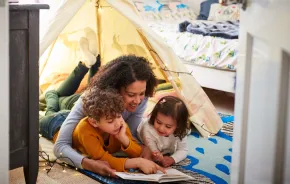
Brain candy — that’s what A, the kid I nanny for, called comics the first time I met her.
She was 9 and lamenting her parent’s characterization of her favorite reading material. The phrase stuck with me; it implied that non-book content was okay to consume, but only in moderation.
Two years later, A was totally immersed in a similar type of literary brain candy: fanfiction. She was obsessed with a limited-run YouTube show. When it ended, she turned to reading and writing fanfiction about its characters.
She loved but, I realized, she only talked about it in the quiet self-conscious voice that so often plagues middle-school girls. It’s as if they’re overly aware that getting too excited about something could lead to judgment and embarrassment.
They’re not wrong. Tween girls’ place in the cultural zeitgeist doesn’t cast them in the kindest light; in fact, girls — and the media they produce and consume — are often seen as terrifying. As too much.
But I encouraged A’s excitement. I told her that I thought her engagement with fanfiction was great. I had my own reasons for thinking so. Her reasons for loving fanfiction were similar to mine.
It’s a miracle I figured out that it was okay to be queer ... one piece of the puzzle was fanfiction.
I grew up in the '90s, when there was no positive mainstream representation of queer people, especially queer women and nonbinary people. I didn’t know any out people in real life, either, so it’s a miracle I figured out that it was okay to be queer. That process took me longer than I’d like to admit, but one piece of the puzzle was fanfiction.
Fanfic’s most potent creators and consumers have always been queer, very often female-identified or otherwise marginalized in some way. A recent survey of Archive of Our Own (AO3) users found that 86 percent identified as female or genderqueer.
Good luck finding mainstream media that reflects anything close to that percentage.
The first time I saw a strong, complex character who also happened to be a queer woman was on a television show but, as almost always happens in mainstream media, this queer character was killed off.
I was devastated. Before this character, I didn’t know a person could be queer and whole at the same time. And so I turned to fanfiction — worlds in which this character did not die, and her story continued.
Fanfiction takes many forms, but its most powerful form is one of subversion. It’s a place where not everyone fits neat categories, where harmful tropes are turned on their heads and where it’s more or less safe to question gender and sexuality norms.
When straight, cisgender white people continue to be portrayed as the norm, it actively harms children who, without other contexts, will grow up thinking there is something wrong with them if they don’t fit those strict categories.
With fanfiction, writers and readers can change the narrative to include a far more diverse array of possibilities for their favorite characters. It’s about making a space for representation that just isn’t in popular culture.
It wasn’t long after A started exploring fanfiction that she began to more openly question gender and sexual/romantic orientations. Her school encourages gender/sexuality discussions, so fanfiction was not her only path of discovery. Nor was it mine. But it was a good jumping-off point for both of us.
A is still figuring out who she is, but the freedom to openly question “taboo” topics like gender and sexuality has allowed her to overcome her self-consciousness in talking about those things with me and her parents.
That sounds like a little more than brain candy to me.











